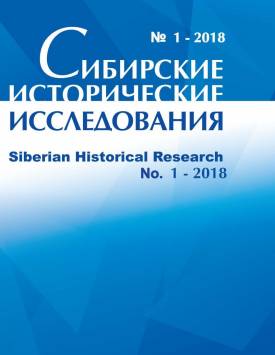Man the Hunter and the legacy of Enlightenment
Based mostly on the author's own field research conducted chiefly among the Wik-Munkan-speaking people in Cape York Peninsular (Aboriginal Australia) from 2005 to 2015, the article analyses how former hunters and gatherers that during the European colonial rule lost many of their old skills, customs, and rites still in large part retain the traditional norms of mutual help and socio-psychological attitudes that hinder property differentiation among them ('immediate-return systems', 'moral economy' - Woodburn1988; Peterson 1993, 2002; Peterson and Taylor 2001, et al.). The author argues that the tradition of mandatory mutual help is the key to the continuation of Aboriginal communal life and the basis for the very existence of and personal integrity among members of Aboriginal communities. The article gives a number of noticeable examples of how these people handle money and items of contemporary urban culture today. In the last sections of it, some negative and dangerous trends in the cultural dynamics of the Wik-Munkan people over the last decades are discussed, and the possibility of rapprochement and constructive transformation of deeply differing cultural traditions and values that have come into contact on Wik soil is questioned.
Keywords
охотники и собиратели,
аборигены Австралии,
вик-мункан,
моральная экономика,
личность,
сообщество,
индивид,
семья,
группа,
культурные традиции,
этос,
городская постиндустриальная культура,
hunters and gatherers,
Aborigines of Australia,
Wik-Munkan,
moral economy,
personality,
community,
individual,
family,
group,
cultural traditions,
ethos,
postindustrial urban cultureAuthors
| Artemova Olga Yu. | Institute of Ethnology and Anthropology (Russian Academy of Sciences); Russian State University for the Humanities | artemova.olga@list.ru |
Всего: 1
References
Артемова О.Ю. Дети в обществе аборигенов Австралии // Этнография детства. Традиционные методы воспитания детей у народов Австралии, Океании и Индонезии. М.: Наука, 1992. C. 17-56
Артемова О.Ю. Колено Исава. Охотники, собиратели, рыболовы. Опыт изучения альтернативных социальных систем. М.: Смысл, 2009
Артемова О.Ю. Настоящий охотник - бедный охотник? («Моральная экономика» и некоторые проблемы социальной эволюции) // Stratum plus. Археология и культурная антропология. 2018. № 1. C. 77-102
Берндт Р.М., Берндт К.Х. Мир первых австралийцев. М.: Наука, 1981
Макконнел У. Мифы мункан. М.: Наука, 1981
Салинс М. Экономика каменного века. М.: О.Г.И., 1999
Australian Bureau of Statistics // Australian Government URL: www.abs.gov.au (accessed date: 30.08.2017)
Bird-David N. Beyond 'The hunting and gathering mode of subsistence': culture-sensitive observations on the Nayaka and other modern hunter-gatherers // Man. 1992. Vol. 27 (1). Р. 19-44
Gammage B. The Biggest Estate on Earth: How Aborigines Made Australia. Sydney et al.: Allen and Unwin, 2011
Ford C. The Aurukun blues of Peter Sutton. An anthropologist hits the skids in Cape York // The Monthly Essays. 2013, may. URL: www.themonthly.com.au/issue/2013 (access date: 09.09.2017)
Jones F.L. The Structure and Growth of Australia's Aboriginal Population. Canberra: Australian National University Press, 1970
Lattimore O. Inner Asian Frontiers of China. London: Oxford University Press, 1940
Martin D.F. Does native title merely provide an entitlement to be native? Indigenes, identities, and applied anthropological practice // Australian Journal of Anthropology. 2015. № 26 (1). Р. 112-127
Martin D.F., Martin B.F. Challenging simplistic notions of outstations as manifestations of Aboriginal self-determination: Wik strategic engagement and disengagement over the past four decades // Peterson N., Myers F. (eds.). Experiments in Self-Determination: Histories of the Outstation Movement in Australia. Canberra: ANU Press, 2016. Р. 210-228
McConnel U.H. Myths of the Muqkan. Melbourne: University Press, 1957
McKnight D. Of Marriage, Violence and Sorcery. The Quest for Power in Northern Queensland. Aldershot: Ashgate Publishing Limited, 2005
Peterson N. Demand sharing: reciprocity and pressure for generosity among foragers // American Anthropologist. 1993. Vol. 95. Р. 860-874
Peterson N. From mode of production to moral economy: sharing and kinship in Fourth world social orders // Paper presented at Ninth International Conference on Hunting and Gathering Societies: hunter-gatherer studies and the reshaping of anthropology. Edinburgh: The Edinburgh Conference Center, 2002
Peterson N. On the persistence of sharing: Personhood, asymmetrical reciprocity, and demand sharing in the Indigenous Australian domestic moral economy // Australian Journal of Anthropology. 2013. Vol. 24 (2). Р. 166-176
Peterson N., Long J.P.M. Australian territorial organization: a band perspective // Oceania Monograph. № 30. Sydney, 1986
Peterson N., Taylor J. The modernizing of the indigenous Australian moral economy: sharing, accumulation and household composition // Paper presented at the Conference on Property and Equality, Halle, Germany, 25-27 June 2001
Sutton P. The Politics of Suffering: Indigenous Australia and the End of the Liberal Consensus. Carlton: Melbourne University Press, 2009
Svizzero S., Tisdell C. The persistence of hunting and gathering economies // Social Evolution and History. 2015. Vol. 14 (2). Р. 3-25
Wells A.E. Milingimbi: Ten Years in the Crocodile Islands of Arnhem Land. Sydney: Angus and Robertson, 1963
Woodburn J.C. Some connections between property, power and ideology // Ingold T., Riches D. and Woodburn J. (eds.) Hunters and gatherers. II. Property, power and ideology. Oxford: Berg, 1988. P. 10-31

